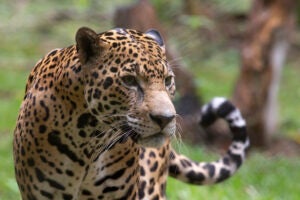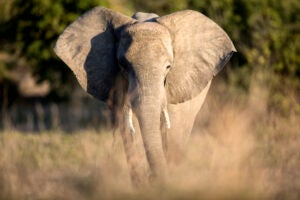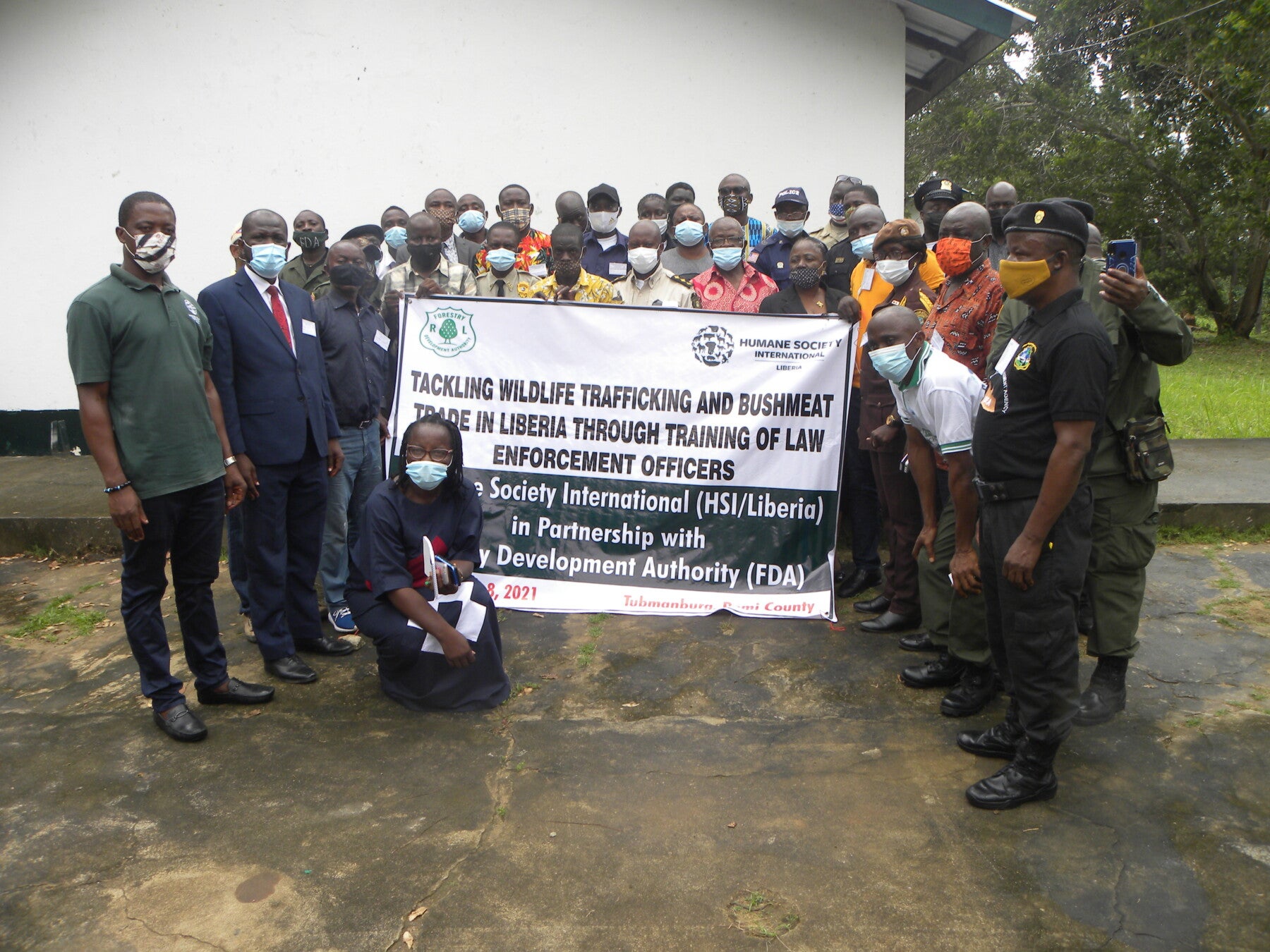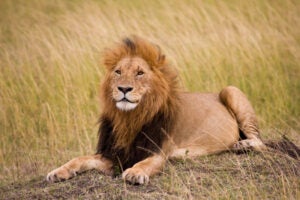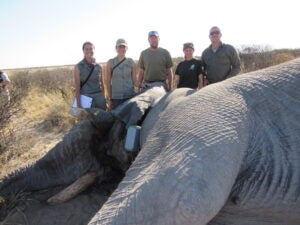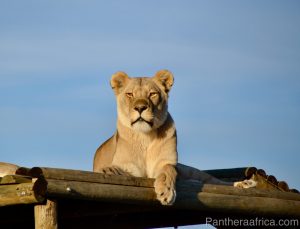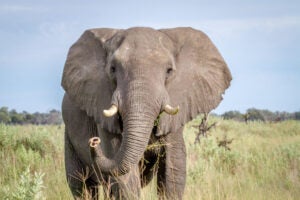
CAPE TOWN—The High Court of the Western Cape has handed down judgment in the application for an interim interdict against the Department of Forestry, Fisheries and the Environment’s (DFFE) 2022 hunting and export quotas for leopard, black rhino and elephant. The application for relief was brought by animal protection organization Humane Society International/Africa and was first heard in Court on 18 March 2022. The judgment handed down on 21 April 2022 confirms that, on the face of it, the 2022 trophy hunting quotas, as issued by the DFFE’s Minister Barbara Creecy, may be arguably invalid and unlawful – which will be determined in Part B of the court case.
The court held that interim relief be granted on two bases:
- The DFFE was not permitted to defer the fixed trophy hunting quotas for the year 2021 onto the year 2022. The deferral was not authorized nor contemplated under respective regulations relating to the international trade of these species, and it also violated the common law principle of legitimate expectation and was thus capable of review under the Promotion of Administrative Justice Act (PAJA).
- The DFFE failed to comply with the consultative process prescribed by the National Environmental Management: Biodiversity Act 10 of 2004 (NEMBA) when making the quota decision in that the requisite public participation conditions were not met, the quota announcement was not published in the Government Gazette, and the Minister may not issue a quota for trophy hunting and export of elephant, black rhino or leopard without valid non-detriment findings.
The judgement also addresses the issues of irreparable harm and balance of convenience. The judgement asserts that if the relief is not granted, 170 animals will be killed during 2022, however, if the interdict is granted, those animals will be spared death pending the hearing of the review. If the review is found to be successful but the animals were killed, their populations may be irreversibly affected, the welfare of those individual animals will have been harmed and the rights claimed above will have been lost.
The only inconvenience to the Minister is that permits will not be issued, pending the hearing of the review. That does not mean that the financial considerations flowing therefrom are lost. If the review fails, the quota will still stand and can be implemented. “If the review is unsuccessful, the desire of the fortunate few who can afford to hunt protected animals exclusively for the purpose of transporting their trophies for display overseas will not have been lost, only delayed”, said Judge Gamble.
Tony Gerrans, executive director for Humane Society International/Africa, says: “Humane Society International welcomes the High Court’s ruling. The relief ordered provides us with the rightful opportunity to fully review the Minister’s Record of Decision in terms of which the quota allocations were determined. This data needs to be considered before such an impactful decision can be made. We are thankful that the High Court recognizes that the killing of our threatened, vulnerable and critically endangered wildlife cannot continue while this matter is heard.”
The interim relief granted means that: 1) the DFFE’s decision to allocate a hunting and export quota for elephant, black rhinoceros and leopard for the calendar year of 2022 is interdicted from being implemented or given effect to in any way; 2) the DFFE is interdicted from publishing in the Government Gazette or in any other way issuing a quota for the hunting and/or export of these species; and 3) the DFFE is interdicted from issuing any permit for the hunting and export of these species, until the matter is reviewed on the merits
Species and trophy hunting facts:
- The leopard is listed as vulnerable on the International Union for Conservation of Nature (IUCN) Red List of Threatened Species.
- The African elephant is listed as endangered on the IUCN Red List of Threatened Species.
- The black rhino is listed as critically endangered on the IUCN Red List of Threatened Species.
- A study detailing South Africa’s role in the international trade in hunting trophies of mammal species listed under the Convention on International Trade in Endangered Species of Wild Fauna and Flora (CITES) during the most recent five-year period for which data are available (2014-2018) demonstrated that:
-
- South Africa is the second largest exporter of hunting trophies of CITES-listed mammal species globally, exporting 16% of the global total of hunting trophies; 4,204 on average per year.
- South Africa is the biggest exporter of CITES-listed mammal species in Africa. South Africa exported 50% more trophies than Africa’s second largest exporter Namibia, and more than three times that of Africa’s third largest exporter, Zimbabwe.
- Between 2014 and 2018 South Africa exported:
- 574 African leopard trophies, or 115 per year on average. 98% of African leopard trophies exported from South Africa were wild source, while 2% were bred in captivity.
- 1,337 African elephant trophies, or 268 per year on average, virtually all wild sourced. 47% of the total were exported to the United States.
- 21 black rhino trophies, or five per year on average, all wild sourced.
- About 83% of trophies exported from South Africa are captive-bred animals or non-native species, and native species with neither a national conservation management plan nor adequate data on their wild populations or the impact of trophy hunting on them. This data challenges the assertion that trophy hunting is critical to in situ conservation.
- The top five species exported as trophies from South Africa are African lion (mostly captive), chacma baboon, southern lechwe (captive, non-native), caracal and vervet monkey. The most common captive-source species exported from South Africa between 2014 – 2018 was the African lion, comprising 58% of the total number of captive-source trophies exported.
- Most (90%) trophies exported from South Africa originated in South Africa.
- 68% of trophies exported from South Africa were from wild-sourced animals, while 32% were from captive animals –19% bred in captivity and 13% were born in captivity.
- The top ten importing countries of South African wildlife trophies are:
| Importing country | Percent of total |
| United States | 54% |
| Spain | 5% |
| Russia | 4% |
| Denmark | 3% |
| Canada | 3% |
| Mexico | 2% |
| Germany | 2% |
| Hungary | 2% |
| Sweden | 2% |
| France | 2% |
- The 2022 Good Governance Africa report entitled “Trophy Hunting in South Africa: Is it worth it? An evaluation of South Africa’s policy decision to elevate trophy hunting as a key conservation tool” asserts that “the government’s apparent commitment to trophy hunting neither considers the opportunity costs associated with the practice nor its negative externalities”. It adds that whilst trophy hunting may generate some economic benefit, it is hardly enough to substantiate the overall harms that it does or to promote it as a conservation benefitting mechanism.
ENDS
Media contact: Leozette Roode, HSI/Africa media and communications specialist, LRoode@hsi.org, +27 (0)71 360 1104

